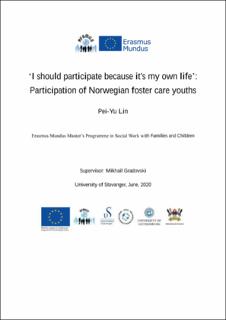| dc.description.abstract | Children and youth participation have been valued since it was regulated in the Articles of the United Nations Convention on the Rights of the Child (UNCRC) in 1989. Scholars established various models to promote it (Hart, 1992; Sinclair, 1998; Shier, 2001; Wong, Zimmerman & Parker, 2010). However, there were limited studies about the participation in foster care youth in Norway, especially from youths’ perspectives. Therefore, this study aimed to explore the participation experiences of youths in Norwegian foster care. The experiences covered the perceptions of speaking up their voices, respecting to their opinions, taking their opinions into account, as well as making decisions in their daily lives.
Qualitative design research was used as a methodological approach with a transformative perspective as its interpretive framework. Three female youth age between 17 and 20 were recruited from a non-profit organization called The Change Factory (Forandringsfabrikkens in Norwegian) for interviews. The researcher conducted online interviews with a semi-structured interview guide. Thematic analysis was adopted for data analysis.
The results of the study showed that Norwegian foster youths perceived that their participations were not meaningful enough to affect their lives, even though they had daily participations. The youths also indicated that the levels social workers took part of their lives or in their decision-making process were different when they reached the legal age of medical consent and adulthood. Notably, the youths conveyed that on some occasions they were not willing to participate in. The factors contributing to the youths’ participation included adult-driven factors, a lack of trust and safety, cooperation, motivation, and fear. All the factors interplayed with each other and also had impacts on whether the youths would give up or keep practicing their participation. Lastly, the impacts that influence their participation the most contained life-changing possibilities, being master of their own lives, standing up for themselves, and fighting for rights of other children and youths.
The study concluded that youth participation has still not been valued enough from the youths’ perspectives. Making this improvement possible requires the awareness of the presumption, attitude, and power of professionals, practitioners, and policymakers towards children and youths. | en_US |

